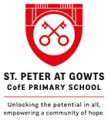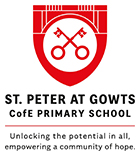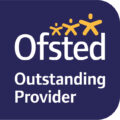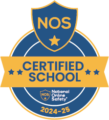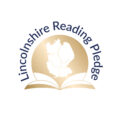Writing
Writing intent:
At St Peter at Gowts, our writing curriculum is inspiring and creative unlocking potential in all. Our curriculum seeks to ensure that all pupils flourish through challenge, support and a broad and balanced curriculum rooted in shared values and consistently high expectations while striving for excellence.
St Peter’s English curriculum is fashioned through our golden threads of values, inspiration, excellence and community.
At St Peter at Gowts CE Primary School, we want all pupils to leave Key Stage 2 as confident and willing writers. Our ambitious writing curriculum is designed to inspire pupils through the use of high quality texts and engaging stimuli. Our consistently high expectations ensure that, through challenge and support, all pupils will gain a coherent understanding and knowledge of the composition and transcription components of the writing curriculum. Through our cohesively planned and progressive curriculum, pupils are equipped with the ability to control their writing consciously and effectively, writing for a range of purposes and audiences. Through our writing curriculum, we strive to achieve excellence for all.
Values – Our writing curriculum embraces our school and British values through the varied texts studied and different writing stimuli. Children are encouraged to step into the shoes of others and write in role. Seeing through the eyes of different groups of people, pupils will develop their empathy and tolerance towards others.
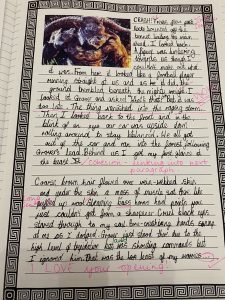
Inspirational – Our inspiring writing curriculum is rooted in the foundations of reading. All pupils engage with a wide variety of high quality texts, including fiction, non-fiction and poetry. Writing is given purpose and meaningful context and pupils know their audience.
Community – Throughout our writing curriculum, children will develop their understanding of communities around the wider world through texts studied and contexts explored. Purpose and meaningful writing invites children to respond to events and have their voice heard through their written word.
Excellence- Our cohesively planned writing curriculum allows all children to achieve and see themselves as authors. Writing is celebrated and shared and pupils take pride in their work.
Writing implementation:
Our writing curriculum is implemented through a text-based approach to inspire and engage our pupils. At the heart of our teaching of writing is the Pie Corbett ‘Talk for Writing’ approach.
- Cohesively planned writing units begin with a pre-assessment of current knowledge and skills in the form of a cold write, from which a learning sequence is constructed.
- Our writing curriculum is progressive in skills and knowledge with transcription components of grammar, spelling and punctuation underpinning topics, which is subsequently built upon through units and year groups
- Teachers plan a sequential journey of learning using the Talk for Writing approach.
- Talk for Writing enables children to ‘say it before they can write it’ and strives to develop oral composition, which then supports the written composition skills.
- At the beginning of writing units, pupils engage with the text they are working with, exploring the text, sentence and word features.
- Pupils explore the texts and readers and writers, and, through engaging activities that help them rehearse the tune of the language they need, followed by shared writing to show them how to craft their writing, children are helped to write in the same style.
- The Talk for Writing approach enables children to read and write independently for a variety of audiences and purposes within writing and across the curriculum. The audience and purpose of writing are intrinsic to teaching and learning at St Peter at Gowts.
- Vulnerable groups of learners are supported through appropriate support and stretch challenges based on assessment for learning, to ensure the needs of all learners are met.
- Talk for Writing working walls and washing lines reflect the learning journey of the class, highlighting key vocabulary, sentence structures, cohesive devices and writing toolkits.
- Talk for Writing supports children in developing the use of new and difficult vocabulary through pre-teaching and magpie-ing.
Encoding and spelling are crucial transcriptional skills that are highly prioritised within our writing curriculum.
- ‘Read Write Inc’ is our chosen systematic synthetic phonics programme. As part of this, all children in Reception and KS1 have daily phonics sessions in small groups where they participate in speaking, listening and spelling activities that are matched to their developing needs.
- In Years 2 to 6, daily spelling sessions on weekly rules/spelling patterns using the Active Spelling approach (developed by L.E.A.D Teaching School Hub). This approached in rooted in current research and has been implemented across school.
- Sessions are ambitious and engaging, with strategies to help pupils learn and apply spelling rules.
Grammatical knowledge and skills underpin all learning in writing.
- Grammar objectives are taught through discrete sessions using the Active English approach (developed by L.E.A.D Teaching School Hub) and throughout the Talk for Writing process.
- Key learning is identified from cold writes and tailored to meet the needs of the whole class and individuals.
- Pupils are given multiple opportunities to apply their knowledge and skills through composition and reflect on the impact of different word classes and grammatical structures.
Handwriting is taught and carefully modelled throughout the school.
- Handwriting is prioritised from the first letter that pupils begin to form, teaching letters in a logical way, focusing on letter group families.
- Our consistently high expectations ensure that, through challenge and support, all pupils will be able to write legibly and with automaticity.
- We recognise that developing transcriptional skills is paramount in enabling pupils to record their compositions.
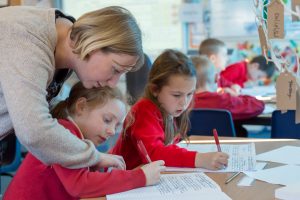 Writing impact:
Writing impact:
As a Year 6 writer transitioning into secondary school, we aspire that pupils not only achieve the age appropriate standard at the end of Key Stage 2, but are also enabled to:
- Write with confidence, clarity and imagination;
- Understand and apply their knowledge of phonics, grammar and spelling accurately;
- Understand how to write for a range of purposes and audience, in a range of genres (including fiction, non-fiction and poetry), using the appropriate style, structure and features;
- Plan, draft, revise and edit their own work;
- Develop a technical vocabulary through which to understand and discuss their writing;
- Develop their imagination, creativity, expressive language and critical awareness.
